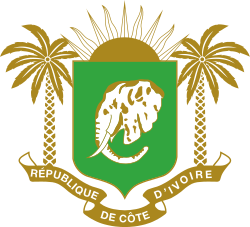Campaign
The President of the Ivory Coast is elected with a five-year mandate through a two-round system, with 50% simple majority required to avoid a run-off. According to the 2000 Constitution of Ivory Coast, candidates are limited to two consecutive terms as president. Incumbent President Alassane Ouattara, first elected in 2010 preceding the 2010–11 Ivorian crisis, stood again to seek a second term. [1]
Opposition party Ivorian Popular Front (FPI) called for a boycott of the elections in protest against the trial of former President Laurent Gbagbo by the International Criminal Court. [2] Presidential candidate Pascal Affi N'Guessan denounced the incarceration of Gbagbo and political conditions under Ouattara:
"Peace isn't only the silence of weapons. Can we say that Ivory Coast is in peace when President Gbagbo is in The Hague? With hundreds of political prisoners in jail, Ivory Coast is not in peace." [3]
Some hardliners in the FPI did not want to participate in elections as long as Gbagbo remained imprisoned, but others felt the party needed to remain engaged in the electoral process. [3]
This page is based on this
Wikipedia article Text is available under the
CC BY-SA 4.0 license; additional terms may apply.
Images, videos and audio are available under their respective licenses.


